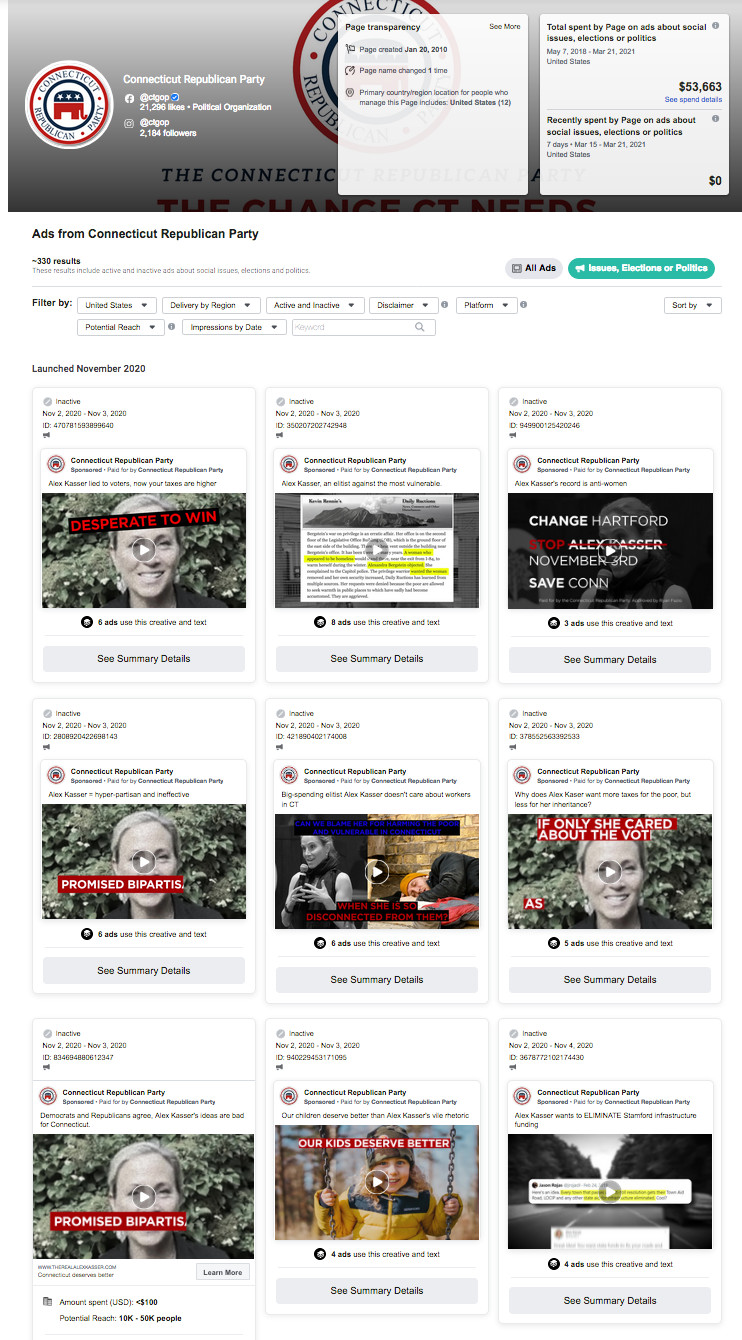On April 7 the State Elections Enforcement Commission ruled on Bob Brady’s complaint alleging the CT Republican Party made excessive and improper expenditures to benefit the candidate committee of Ryan Fazio, who challenged State Senator Alex Kasser (D-36) in the 2020 election.
Brady’s complaint was accepted for investigation by the SEEC on March 17.
The commission issued its ruling just three weeks later, on April 7.
Named as respondents affiliated with the CT Republican Party as well as the Fazio for Connecticut candidate committee were JR Romano of Branford (former chair of the CT Republican Party statewide committee), Warner C Pyne of Woodbridge (Treasurer of the Connecticut Republican Party), and Mr .Fazio. Also named was Joseph L Romano of Riverside, who was treasurer for the Fazio candidate committee.
Mr. Brady alleged the respondents violated regulations governing Citizens Election Program (CEP) participating candidates and their committees, including making organization expenditures to a single campaign in excess of $11,900, and that the CT Republican Party made impermissible expenditures totaling $64,764.42 to benefit the Ryan Fazio candidate committee via attack ads targeting Senator Kasser.
The SEEC found that the payments did not violate the limits on the amount the party committee could spend. Nor were the ads impermissible based on being negative.
“The complaint inadvertently rests on application of statutory provisions that do not reach the conduct alleged.”
State Elections Enforcement Commission, April 7, 2021
Per General Statutes 9-601(25), which defines organization expenditures including “a communication” made to promote the success or defeat of any candidate.
“An organization expenditure may therefore be a negative communication that opposes a candidate.”
State Elections Enforcement Commission, April 7, 2021
They specified two changes to Public Act 13-180 from 2013 that made it possible for a state central committee to fund negative ads against a candidate it opposed.

Mr. Brady referred to General Statutes 9-718( a) and spending limit of $11,900. But the SEEC said that limit is for a town committee, not a State Central committee like the Connecticut Republican Party state central committee.
“That group had no limits on how much they may spend on organization expenditures for a candidate.”
State Elections Enforcement Commission, April 7, 2021
In 2013 the General Assembly lifted restrictions on expenditures that opposed candidates instead of just promoting them, and eliminated the spending limit on state central committees to benefit candidates.
Prior to 2013 the law allowed only expenditures that promoted a candidate.
“The two changes combined to allow a state central committee to fund unlimited attack ads against a candidate that it opposed.”
State Elections Enforcement Commission, April 7, 2021
The SEEC did note that ads must include a disclaimer saying they were paid for by the state central party and approved by the candidate it benefits.
They said some of the attack ads failed to include the required “approved by” language on Fazio’s part, but that they had no jurisdiction to penalize the CT Republican Party based on a “minor attribution violation, which would delay resolution of this matter.”
Mr. Fazio released a statement on Saturday saying, he was pleased but unsurprised that the SEEC dismissed the complaint. He said Brady’s allegations were politically motivated.
“At the time it was made, I said the complaint’s statement of facts and the legal interpretation were totally wrong, which the SEEC’s speedy dismissal confirms,” Fazio said.
“Local Democrats owe an apology to my campaign treasurer, and all of our volunteers, for their attempt to inflict reputational harm for pure political gain,” he added.
“Frivolous complaints and dirty tactics like these are becoming a common tactic of Greenwich Democrats and will sadly discourage regular people from participating in local government due to the potential reputational and financial costs,” Fazio continued. “None of this serves our wonderful community well. Both parties should encourage local political involvement, which strengthens our democracy.”
“I remain very proud of my campaign and our great volunteers and know that no matter what we will continue to work to make our community and state a better place.”